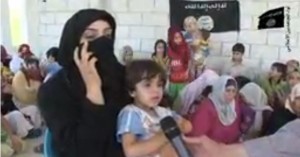Displaced from Latakia Countryside Speak of Their Suffering

Raheel Ibrahim*
Editors’ Note: The names of some of the interviewees were changed to ensure their security.
(Latakia, Syria) – In a school crammed with displaced people from villages near Latakia, Um Raed, 44, sits in a room while the women around her chatter on, signs of grief and anxiety on their faces. In this school, only children seem able to forget the glum atmosphere by playing in the schoolyard.

When asked what happened before she was displaced, Um Raed sobbed and told of the kidnapping of three of her children – 18-year-old Sireen, 7-year-old Qays, and 10-year-old Raed.
Um Raed is a widow whose eldest son is a soldier with Syrian President Bashar al-Assad’s army in Aleppo. She spoke of her pain the last time she saw her youngest children, not knowing what became of them.
“Raed and Qays looked at me for help, shaking with fear, but I was unable to do anything,” she said. “They kidnapped them all.”
Since this incident, Um Raed decided to go by the name of her youngest son. However, she still worries about her eldest, Akram.
“I don’t know if he is going to come back to me alive or in a coffin,” she said.
Um Raed was displaced from the village of Oubeen in Latakia’s countryside after opposition forces attacked the province in what Syrian activists dubbed the “battle for the liberation of the coast,” which began on August 4. The opposition was able to seize control of around 15 Alawite villages before government forces managed to drive them out and residents could return. Two pro-Assad Facebook groups, “Latakia News Network” and “Latakia Countryside News Network” announced the burials of those who had been killed in these villages.
Stories of kidnapping were prevalent among the displaced from the Alawite villages who spoke with the Damascus Bureau.
Abu Mas’ab, 50, is from the village of Nabata. He says that his village came under surprise attack by armed opposition forces, and claims that almost all the men of the village were killed.
“The women were taken captive, but one killed herself to avoid that fate,” he added.
Abu Mas’ab says that he saw a woman cut her veins so that she would not be captured alive, before a gunman finished her off with his bullets.
A widely shared video by the opposition-allied Mujahedeen Brigade Media published on YouTube shows a masked person referred to as “Abu Soheib Al-Liby.” The source of the video remains unverified.
In the video, Abu Soheib talks about the women and children he and his group hold hostage, and that they are being held in order to exchange them for prisoners held by Assad’s regime. Abu Soheib adds that the hostages are being treated well and according to the principles of Islamic Shariaa.
The video also shows a captive woman saying that there are around 105 women and children from various villages being held hostage. She calls on the UN and the international community to take action for their release and notes the good treatment of the kidnappers.
At the time of writing, there are no confirmed numbers of kidnapping victims from the last battles in the Latakia countryside. Media reports cite approximately two hundred kidnappings of residents from Alawite villages. Writer Nabil Fayyad, described by the opposition as close to the Assad regime, wrote of mass graves in several Alawite villages in the province of Latakia on his Facebook page based on sources from the town of Slunfeh’s police station. He claims that the bodies were disfigured and dismembered.
On the other hand, the Syrian Observatory for Human Rights said that regime forces killed around 20 people, at least half of whom were civilians, on August 10 during air raids on the Sunni-majority village of Salma, which is considered an opposition stronghold in the Latakia countryside.
Mounir, 28, works in emergency relief in one of the five schools in the city of Latakia, which is controlled by the government, that were set up to receive displaced people from the province of Latakia. He says that basic necessities are secured through donations and dropped off at a makeshift warehouse at one school. The donations are received by a committee appointed by the province governor, which then registers donors’ names and gives them a pass to deliver aid to one of the shelters after examining the items donated.
A Damascus Bureau reporter was only able to visit one school due to restrictions placed on journalists, but she noted the overcrowding as well as lack of mattresses and appropriate furniture for families.
Mounir expressed anger at the way the government handled the Alawite villagers, who suffered much during the last battles.
“Isn’t it enough that these villages were marginalized by the government in the past years?” Mounir asked. “Is our humanity and dignity disregarded so much that the official media doesn’t even mention these massacres?”
“Our young men are fighting in the army, we are being killed, our women kidnapped, and the official media did not even bother to speak about us, or at least document the names of those who have had the worst crimes committed against them,” he added.
* Raheel Ibrahim is the pseudonym for a journalist who lives inside Syria.
